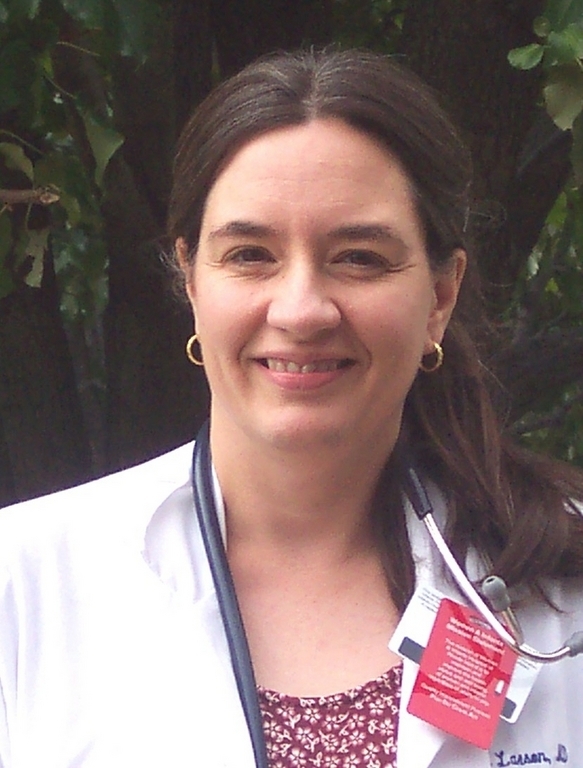
In pregnancy and childbirth, women’s primary doctors are ob/gyns – experts in reproductive health. But having a baby can affect the whole body, and a woman’s underlying health is a big factor in pregnancy. That is where Dr. Lucia Larson and her colleagues come in.
Larson, an internist specializing in health complications surrounding pregnancy, was recently named director of obstetric and consultative medicine at Women & Infants Hospital of Rhode Island. She is also on the faculty at the Warren Alpert Medical School of Brown University.
Larson answered questions about her clinical work, her research and efforts to expand the pool of doctors with her kind of expertise.
PBN: What are some of the more common problems you deal with?
LARSON: We see a whole range of medical issues. We see hypertension, thyroid disease, asthma, renal disease, liver disease, pulmonary embolisms … the whole range of medical problems that can happen outside pregnancy. There are some that have increased risk of occurring during pregnancy, such as thromboembolic disease.
There are several diseases that present in pregnancy that have life-long implications, such as gestational diabetes, which increases the risk that the woman will develop diabetes in the next five years or later in life. We know that women who have preemclampsia are at a greater risk for cardiovascular disease.
We also know that women have different needs for different medications during pregnancy – there may be different drugs or different doses used – and then during breastfeeding. And the other issue for us is pre-pregnancy counseling, so a woman who is a diabetic will have the best outcome for herself and for her baby if she’s well-controlled going into the pregnancy. …
As with everything else, those women who have less access to care are likely to come to us sicker. And those who have more social issues can be harder to get over those barriers to get the medications they need, come in for visits, for instance, if they don’t have a car. We do have a van service, and we do our best with that. Obviously we have language barriers and cultural issues.
PBN: RIte Care ensures that all pregnant women in the state have access to prenatal care, but many may not have gotten good health care before that, and they may become uninsured within weeks of giving birth. How big of an issue is that?
LARSON: We do find in these women there may be undiagnosed disease – hypertension, thyroid, hepatitis – or maybe the woman did know she was a diabetic, but she’s not actually getting the treatment she needs … and it’s more likely to have an adverse effect on the pregnancy and on the baby, and on her future health.
After delivery, we often do have a limited time frame to get everything covered, and we are rushing to do things in those first weeks postpartum, which is not a great time. Sometimes the physiological changes from pregnancy haven’t gone back to normal, and we’d prefer to wait, but we’d rather not have to go without [the tests or treatments].
We always try to make sure they have access to ongoing primary care, so we do try to get them into places like free clinics. It doesn’t always work. Women aren’t always able to make that happen, so I know some people do fall off the radar screen.
PBN: Tell me a little more about your research, especially regarding recurrent pregnancy loss.
LARSON: I have a broad interest in medical problems surrounding pregnancy. In terms of recurrent pregnancy loss, it mostly focuses on thrombophilias [the predisposition to forming blood clots]. The thinking is that the blood clots form in the placenta, and if they disrupt the blood flow through the placenta, that may cause a pregnancy loss or may be associated with poor fetal growth or preemclampsia. There’s a whole body of literature focused on looking at things to prevent the clotting, like baby aspirin and heparin. We’ve been involved in studies that have to do with the use of Lovenox, which is a form of heparin, and baby aspirin. …
However, if there are medical issues – women who have abnormal thyroids may have miscarriages; women who are poorly controlled diabetics – so certainly anything that’s related to a medical condition does fall within our realm. … And now older women are getting pregnant, so we are seeing more medical issues in pregnancy than in the past.
PBN: You’ve directed a fellowship in obstetric and consultative medicine since 2005. Can you tell me more about the program and the need for specialized training in this field?
LARSON: It’s a two-year fellowship that is taken after completing a residency in internal medicine. … We graduate our 20th fellow this June. … We have trained people from all over the world, and most have moved into academic positions. A number of Canadians have come in; right now we have an endocrinologist from Sydney, Australia; we had a woman from New Zealand; one of our previous fellows is Dr. Sandra Kweder, who came to us from the [U.S. Food and Drug Administration] and then went back to work there.
This is a bit of a unique specialty. We are, right now, the only fellowship in this country, at Women & Infants and Brown, but we really want to see more of us all over. There is a lot of international interest in obstetric medicine.
PBN: You are starting a new traveling fellowship with the Imperial College in London and Brown, focused on metabolic disease in pregnancy.
LARSON: That’s a very interesting project in cholistasis in pregnancy. It’s associated with elevated bioacids in the mother as well as liver abnormalities. It’s also associated with intrauterine fetal demise, generally in the third trimester. The thinking is that what’s happening is the elevated bioacids are depositing in the fetus’s cardiac conduction system and causing an arrhythmia which then leads to death. So this research project is looking at the transport of bioacids across the placenta. The woman who’s going to be working on the U.K. side is Catherine Williamson, a well-respected researcher in obstetric medicine who has a special interest in cholistasis. So the fellow is going to spend some time with Cath Williamson and then some time here at Women & Infants, so we can work together and share ideas.












